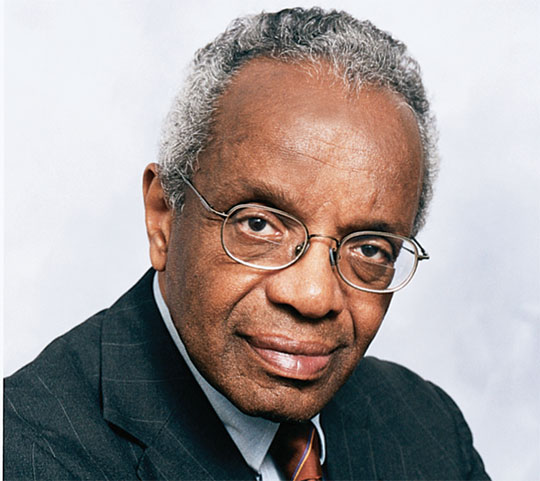Honoring Derrick Bell's Legacy
The sixth annual Critical Race Studies in Education Conference, hosted at TC in May, honored the late Derrick Bell, the first tenured African-American professor at Harvard Law School, whose work focused on race and social justice.
“I’ve owned this book since I was a puppy Legal Aid lawyer in New York City,” Janice Robinson, TC’s Vice President for Diversity and Community Affairs, told audience members as she held aloft Bell’s masterwork, Race, Racism and American Law. “Listen to these chapter headings. ‘American Racism and the Uses of History.’ ‘Interracial Sex and Marriage.’ ‘Public Facilities: Symbols of Subordination.’ ‘Discrimination in the Administration of Justice.’ Have any of these issues gone away?”
Organized by Michelle Knight-Diop, TC Associate Professor of Education, and Lee Bell, Professor of Education at Barnard College, the conference included youth performances coordinated by Urban Word and spanned theory and practice. David Gilborn, Professor of Critical Race Studies in Education at the University of London, delivered the keynote, and three leading scholars were honored: Gloria Ladsen-Billings, of the University of Wisconsin–Madison; Daniel Solórzano, of the University of California, Los Angeles; and TC alumnus Marvin Lynn, of the University of Wisconsin–Eau Claire.
Knight-Diop and doctoral student Joanne Marciano presented on “Troubling College Readiness and Access for Black and Latino High School Youth”; Yolanda Sealey-Ruiz, TC Assistant Professor of English Education, co-led “Give Them Something to Talk About: Racial Literacy Roundtables as Community Building in Higher Education”; and TC Professor of Education Celia Oyler, with students Wanda Watson, Sarah Schlessinger and Maryann Chacko, spoke on “Towards a Praxis of Critical Inclusivity.”
Theodora Berry, President of the Critical Race Studies in Education Association, recalled the killing last February of Trayvon Martin, an African American high school student, by George Zimmermann, a white man who had followed him because he seemed “suspicious.” Florida police initially reported that Martin was six feet tall and weighed 160 pounds, while Martin’s family described him as being six-foot-three and 150 pounds. The autopsy listed him as five-foot-eleven and 158 pounds.
To Berry, these conflicting accounts underscore the need for “counter stories” of black identity. “Race is often placed in the forefront,” she said. “To date, the only counter stories reported in regard to Trayvon Martin are those regarding his height and weight. If George Zimmermann had had access to those counter stories – if he knew what was worth knowing about young men of color – Trayvon might be alive today.”
Published Friday, Dec. 7, 2012

